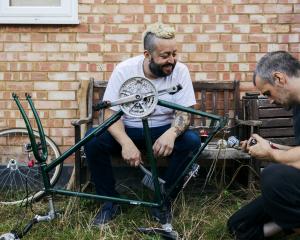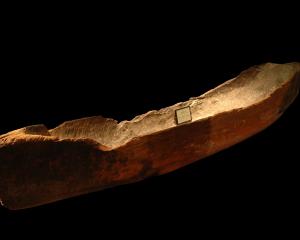
Dear Johnny J.
My mother sent me a clipping from the Otago Daily Times a few years ago. It reported that you were the new principal of a school in Central Otago. Well, I’m relieved the Government has made corporal punishment illegal in New Zealand schools. Otherwise, a school in Central Otago was in for a bloodbath.
You see, the clipping reminded me of two things. Firstly, I remembered you being my Standard 4 teacher at primary school. Secondly, I remembered that I intended to write to thank you for making me a better person, especially a better teacher.
The classroom at my primary school was on the second level. It wasn’t a multi-storey school but it stepped up a hillside, so it was on three levels. Our Standard 4 classroom was at the top of the stairs and I remember it for two reasons.
Firstly, it was right beside a big landing where my friend Alan and I built a model landscape - it was actually just painted papier mache hills with roads and cars. We made it for the school fair, though I can’t imagine how we made any money out of it. We put all our Micromodel cars on it.
Alan had a lot more than me because his father was a manager at the department store where we bought our Micromodels. My father worked on a road construction gang so I suppose we were the ideal pair for making a model landscape with roads and cars.
Come to think of it, that might have been why, for the next six years, I wanted to be a civil engineer.
Then I decided to be an English teacher. I remember the moment I broke the news to my sixth form English teacher, Mary H. She threw her hands in the air and dragged me to the bookroom where she threw lots of books at me and told me to get studying right away. The problem was that I was in an engineering class for whom academic English was not a priority.
I’ve still got my well-thumbed copy of Oliphant’s A General Certificate English Course. Hastily inscribed on the fly is ‘‘William Lennox. Own copy. MH’’.
The only detail I remember of the Standard 4 model landscape is a roadside hoarding we made out of cardboard. It advertised a car called the ‘‘Rolls Canardly - rolls down hills and can ’ardly get up the other side’’. We thought it was hilarious.
I should have realized right there that I was more interested in words than engineering.
But you, Mr J. were one of the few teachers I had who inspired me to be a teacher. We called you (among ourselves) ‘‘Johnny’’. Even our parents did. It was a cool name back then, in the 1950s. There was Johnny Ray, Johnny Mathis, Johnny Mercer and Johnny B. Goode and our parents knew the words to Frankie and Johnny because Tex Morton sang it on the radio every single Sunday.
There was something vibrant and energetic about the name Johnny, but it was also a bit tragic. So it suited you. You were quite handsome with your slicked back hair and your flashing smile, but you had a terrible temper.
I’ve had plenty of other teachers who got angry, but they usually found ways to redirect or suppress their frustration after too many hours with kids who wanted to be somewhere else.
(Except Whacker Brown, who once caned half of our physics class, but he was too young to know better. Anyway, we know he got ticked off later by the deputy principal.)
We always knew when some teachers were at the end of their respective tethers.
An English teacher called Ernie J. would read Shakespeare flamboyantly all period, which I loved. Our maths teacher, Bill W. just clamped his jaw - the rippling muscle from jaw to temple was a sure sign. Another maths teacher, Eric H. had a nasal voice that would soar to a crystal-shattering pitch, and Oz A. would sulk at his desk until he dozed off.
My favourite teacher was Denis D. He was fun when he was riled - he imposed ridiculous penalties then mocked them. He once told me to stand with my nose touching the light switch then promptly told me off: ‘‘Lennox! Stop being silly! You look ridiculous. Sit down!’’.
In fact, Denis D.’s parody of the tough teacher became another influence when I became a teacher.
I recall confiscating a comic from a student and taking it into the back room where I loudly ripped up a whole newspaper. I gave the intact comic back to the student at the end of the lesson, saying something like, ‘‘You can have this. I’ve read it’’. In fact, I only remember that incident because I met the student years later and he told me about it, one of the few things he remembered from being in my class.
But you, Johnny J., alerted me to my own erratic emotions and motivated me to control them - and to have nothing to do with corporal punishment.
In my first school, an all-male establishment in the 1970s where caning was rampant, I was the only teacher who didn’t cane. Instead I somehow instilled a tone of mutual respect. It wasn’t hard. I think it helped that I told them from the outset that I didn’t believe in corporal punishment.
I want to thank you for that too, Johnny J. But I realize you probably don’t remember the crucial occasion that launched me on this enlightened path, the second reason I remember our Standard 4 classroom at the top of the stairs.
I have no memory of the incident, but we must have been guilty of dire and malicious behaviour because eight of us found ourselves standing at the front the room being strapped.
I guess the fact that I can’t recall the offence discredits whatever warped behaviourist theory that once allowed bad tempered men like you to beat children.
Anyway, I do recall that I was last in the line-up of eight boys. Those before me got two of your quite vigorous whacks on their palms. That exertion didn’t diminish your energy, but it did impair your reason.
You turned to me. ‘‘And you Billy Lennox - you should have known better,’’ you said. And gave me four whacks. I remember thinking at the time there was something wrong about that. Hadn’t I read about judges giving shorter sentences for first offenders? What happened to time off for good behaviour?
I’ve been pretty hot on avoiding injustices ever since.
So thanks Johnny J. Bastard.
The book
Human Kindness, is a collection of essays by writers over the age of 60, edited by Renee Hollis, published by Exisle Publishing ($29.99). It is part of the Timeless Wisdom series.
Comments
BStard, MA, DipEd.,
You never hit. You just said we were 'half baked'. The History teacher confessed he was rep, IRA. The gym teacher flogged with a skipping rope. School made soldiers and Labour MPs of us.












